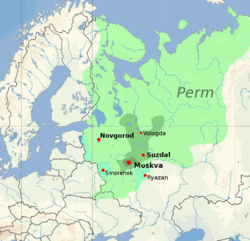Grand Duchy of Moscow
| Grand Principality of Moscow | ||||||||||||||||||
| Великое Княжество Московское Velikoye Knyazhestvo Moskovskoye |
||||||||||||||||||
| Vassal state of the Golden Horde (1283-1480) | ||||||||||||||||||
|
||||||||||||||||||
|
Territorial development between 1390 and 1530
|
||||||||||||||||||
| Capital | Moscow | |||||||||||||||||
| Languages | Old East Slavic | |||||||||||||||||
| Religion | Russian Orthodoxy | |||||||||||||||||
| Political structure | Vassal state of the Golden Horde (1283-1480) | |||||||||||||||||
| Grand Duke | ||||||||||||||||||
| • | 1283–1303 | Daniel (first) | ||||||||||||||||
| • | 1462–1505 | Ivan III the Great | ||||||||||||||||
| • | 1505–1533 | Vasili III | ||||||||||||||||
| • | 1533–1547 | Ivan IV (last) | ||||||||||||||||
| History | ||||||||||||||||||
| • | Established | 1283 | ||||||||||||||||
| • | Tsardom proclaimed | 22 October 1547 | ||||||||||||||||
| Area | ||||||||||||||||||
| • | 1505 | 2,500,000 km² (965,255 sq mi) | ||||||||||||||||
| Currency | Ruble | |||||||||||||||||
|
||||||||||||||||||

Byzantine imperial eagle (adopted 1472)
The Grand Duchy of Moscow (Russian: Великое Княжество Московское, Velikoye Knyazhestvo Moskovskoye), or Grand Principality of Moscow (also known in English simply as Muscovy), was a late medieval Rus' principality centered on Moscow and the predecessor state of the early modern Tsardom of Russia.
The state originated with Daniel I, who inherited Moscow in 1283, eclipsing and eventually absorbing its parent duchy of Vladimir-Suzdal by the 1320s. It later annexed the Novgorod Republic in 1478 and the Grand Duchy of Tver in 1485.
After the Mongol invasion of Rus', Muscovy was a tributary vassal to the Mongol ruled Golden Horde (under the "Tatar Yoke") until 1480. Ivan III further consolidated the state during his 43-year reign, campaigning against his major remaining rival power, the Grand Duchy of Lithuania, and by 1503 he had tripled the territory of his realm, adopting the title of tsar and claiming the title of "Ruler of all Rus'". By his marriage to the niece of the last Byzantine emperor, he established Muscovy as the successor state of the Roman Empire, the "Third Rome".
...
Wikipedia

